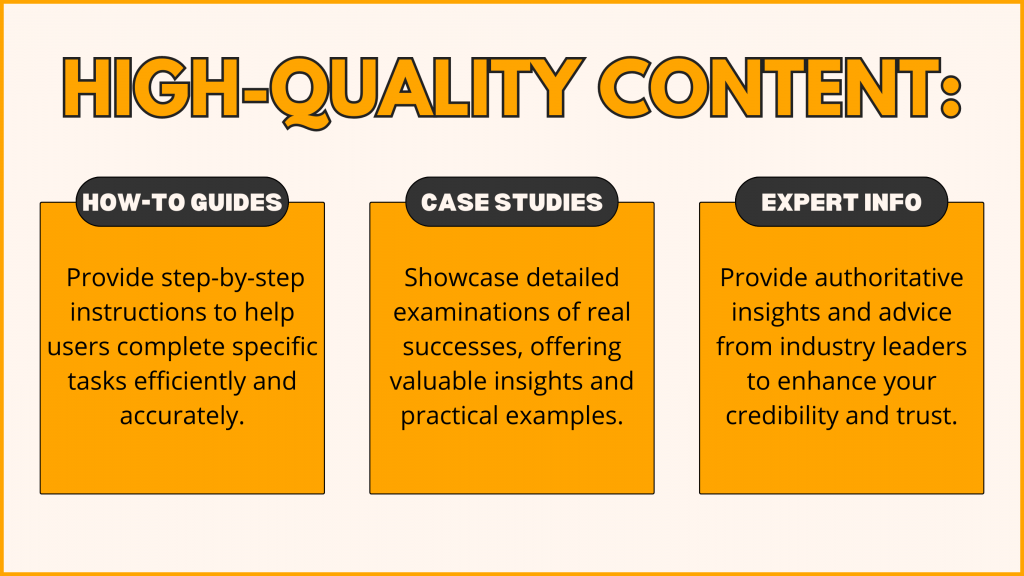
Trust is the foundation of any successful relationship, and that holds true to the one between your website and its visitors. Think back to the last time you made an online purchase or visited a website. What made you trust that particular website? Was it the design, the content, or something else?
In this blog post, we’ll share five effective ways for your website to build trust with both your customers and search engines.
1. Ensure High-Quality Content
High-quality content is the bedrock of trust. When visitors find your content valuable, accurate, and engaging, they’re more likely to trust your site and return for more.
Tips for Creating Valuable Content
There are a few key elements to keep in mind when creating high-quality content for your website:
- •Research thoroughly: Ensure all information is accurate and up-to-date. This involves checking facts and citing credible sources.
- •Write clearly: Use simple language and break down complex ideas into easily digestible chunks. Avoid using technical jargon unless your audience is familiar with it.
- •Engage your audience: Use images, videos, and infographics to make your content more engaging. Visual aids can help explain complex concepts and keep readers interested.
Examples of High-Quality Content
For inspiration, here are a few examples of high-quality content:
- •Detailed how-to guides: Similar to what you are reading right now, guides that provide in-depth information and actionable tips.
- •Expert opinions and interviews: These types of content establish your authority on a topic and provide valuable insights
- •In-depth case studies: Showcasing real-life examples where your product or service has solved a problem can be highly persuasive.
- •Comprehensive product reviews: Honest and detailed reviews help potential customers make informed decisions.
By consistently providing valuable information, you establish your website as a reliable source, fostering trust and encouraging repeat visits.
2. Use Security Features
The last thing your customers want to worry about is the security of their personal information when visiting your site. By implementing strong security measures, you can give them peace of mind and demonstrate your commitment to protecting their data.
Implementing SSL Certificates and HTTPS
SSL (Secure Sockets Layer) certificates are small data files that encrypt communication between a website and its visitors. They provide an extra layer of security for customer data, such as credit card numbers, passwords, and personal information.
Implementing an SSL certificate establishes a secure connection with your website visitors and helps prevent hackers from intercepting data. It also has the added benefit of improving your search engine rankings as Google prioritizes websites with HTTPS over those without.
Regular Security Updates
As technology evolves, new security threats emerge. To keep your website secure, it’s important to regularly update your software and plugins. Developers often release patches to fix vulnerabilities in their products, and staying up-to-date with these updates can prevent potential attacks on your site.
3. Showcase Customer Testimonials and Reviews
Social proof is a powerful trust-builder. When potential customers see positive testimonials and reviews, they’re more likely to trust your site and its offerings. However, there are specific strategies to maximize the impact of testimonials and reviews.
Best Practices for Collecting and Displaying Testimonials
Some ways to effectively collect and display customer testimonials include:
- •Ask for feedback: Request reviews from satisfied customers. You can do this through follow-up emails, post-purchase surveys, or by offering incentives.
- •Display prominently: Feature testimonials on your homepage, product pages, and landing pages. This visibility ensures that new visitors see them quickly.
- •Use authentic reviews: Genuine, detailed reviews are more convincing than generic praise. Encourage customers to share specific experiences and benefits.
Use Case Studies to Demonstrate Results
In addition to customer testimonials, case studies provide a powerful way to showcase your product or service.
Examples of case studies include:
- •Success stories: Highlight how your product or service solved a customer’s problem. These detailed stories are compelling and can significantly influence potential buyers.
- •User-generated content: Encourage your customers to share their experiences on social media and repurpose this content on your website. This user-generated content adds authenticity and social proof to your brand.
- •Highlight data: Use data and statistics to demonstrate the results achieved by your customers. This can include metrics such as increased sales, improved efficiency, or cost savings.
4. Optimize Your Website’s User Experience (UX)
A seamless user experience shows visitors that you value their time and effort, which in turn builds trust. Plus, search engines reward sites that provide a good UX.
Key UX Improvements to consider:
- •Navigation: Make it easy for users to find what they’re looking for. A well-organized menu, clear categories, and a search function are essential.
- •Loading speed: Ensure your site loads quickly to prevent user frustration. Use tools like Google’s PageSpeed Insights to identify and fix issues.
- •Mobile-friendliness: Optimize your site for mobile devices. A responsive design adjusts the layout to fit different screen sizes, providing a better experience for mobile users.
Tools and Resources for UX Optimization
There are various tools and resources available to help you improve your website’s user experience. Some popular options include:
- •Google Analytics: This provides data on user behavior, such as bounce rates, time spent on site, and more. Use this information to identify areas for improvement.
- •Usability testing tools: These tools allow you to get feedback from real users on your website’s usability. Some options include UserTesting, Optimal Workshop, and Trymata.
- •Heatmap tools: Heatmaps show where users are clicking and scrolling on your site, providing insights into how they interact with your content. Examples of heatmap tools include Crazy Egg and Hotjar.
Continuously monitoring and improving upon your website’s UX will ensure your customers have a positive experience while interacting with your brand online.
5. Maintain Transparency and Authenticity
Last but not least, it’s important to maintain transparency and authenticity in your website’s content and design. Users value honesty and authenticity, and they can quickly spot when a brand is being misleading.
To show authenticity, be sure to provide:
- •Clear communication: Make sure that your website’s messaging is clear and easy to understand. Avoid using complicated jargon or vague language.
- •Honest product descriptions: Provide accurate and detailed descriptions of your products or services. Avoid making exaggerated claims or hiding important information.
- •Accessible contact information: Make it easy for users to contact you with any questions or concerns. Displaying your phone number, email address, or contact form on your website can help build trust with your audience.
- •Policies and disclosures: Be transparent about your business practices, such as privacy policies and terms of use.
Building a Trustworthy Website With LinkNow
Fostering trust is crucial for both customer loyalty and search engine rankings. By ensuring high-quality content, using security features, showcasing customer testimonials, optimizing user experience, and maintaining transparency, your website can foster loyalty and achieve better search engine rankings.
If you need help creating a trustworthy and authentic website, LinkNow is your partner. We specialize in website design, SEO, and other digital marketing services to elevate your online presence and build trust with your audience.
Contact us today to see how we can help you create a transparent and trustworthy website for your business.


